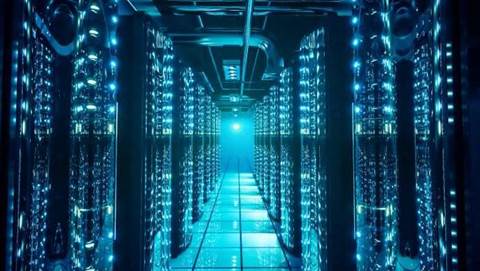Global internet traffic surged by almost 40% at the height of the pandemic between February and mid-April 2020 — but this number has by no means reached its peak.
New technology like 5G and the IoT are expected to drive long-term growth, fuelling the explosion in demand for data centres. However, this is bringing the industry into the spotlight for its intensive carbon footprint as it accounts for about 1-2% of global electricity demand.
Southeast Asia, in particular, saw 40 million people come online for the first time in 2020, and is set to become the fastest growing region for colocation data centres within the next five years. Yet, these very same countries are also expected to be disproportionately affected by climate change.
In Asia, an average of $2.8 trillion and $4.7 trillion of GDP will be at risk every year due to increased heat and humidity – accounting for more than two-thirds of the total annual global GDP impact. Clearly, Asia cannot afford to disregard the risks and devastating effects of the climate crisis.
Recognising this, countries across Asia, from Singapore to Japan and Indonesia, have rolled out ambitious climate action plans to decarbonise their industries, with the aim of achieving net-zero emissions. Singapore, for instance, recently issued a moratorium on new data centres amid mounting environmental concerns — a worrying development that highlights the urgent need to address sustainability concerns now, or risk stifling growth of not just data centres, but also the entire digital economy that relies on data as its lifeblood.
Apart from policy-makers, businesses are also taking an increased interest in sustainability, as more consumers and employees demand corporations to do better on ESG (Environmental, Social, Governance) issues. This shift in consumer behaviour comes as the COVID-19 crisis continues to rage through many parts of Asia, fuelling a growing consensus that businesses should shoulder a greater responsibility to society at large.
Furthermore, with multiple studies showing that ESG commitment drives better financial performance, sustainability will become the core principle by which businesses attract top talent, market to consumers, and secure investments.
As sustainability quickly rises to become the core principle underpinning every government policy and business model, energy-guzzling data centres will only come under even greater scrutiny. The data centre industry now faces a conundrum: How can it build faster and bigger, but yet greener? I believe that the key is in building smarter.
Data centres must push new frontiers in intelligence
Energy efficiency is critical to minimising the carbon footprint of data centres. In fact, for the past few years, swift improvements in energy efficiency have been able to outpace the rapid expansion of data centres. Since 2015, energy consumed by data centres has remained relatively flat, even as global internet traffic tripled and data centre workloads more than doubled.
But in the wake of an exponential growth in demand, data centres must now push new frontiers, building connectivity and intelligence into their designs to achieve ever greater energy management and operational efficiency.
NextDC, an Australian data centre operator, is taking this step by implementing ABB’s data centre automation system across its facilities. With this, NextDC will be able to consolidate data on power consumption, cooling, and other performance metrics in one system, enabling advanced prediction and optimisation to be performed.
Such smart systems will be critical as we move into an era of 5G and IoT, which will demand greater responsiveness and predictive capabilities. To put things into perspective, let’s imagine a future where self-driving cars are the norm. During rush hours, IT loads from such cars will surge, such that demand can go from zero percent to 100 and back to zero within a single day. Intelligent data centres will be able to adapt quickly to such transient energy demands, delivering electricity and cooling in the most effective manner.
Smart grids can cut excessive energy use
Data centres must look towards renewable energy to truly decarbonise. However, renewable energy is often reliant on weather conditions, and can be unreliable sources of power — a sticking point for data centres where an outage can cost up to $5,600 a minute.
Hence, to harness the full potential of clean energy, data centres must also plug into the smart grid. Unlike the conventional grid where electricity flow is unidirectional, a smart grid enables two-way communication and energy flow between a power plant and homes or businesses.
Smart grids are better able to account for the unpredictability of renewable energy, making full use of it when in abundance and switching seamlessly to other power supplies when necessary. This is key to integrating renewable energy into the current electricity mix, delivering a reliable, constant, and clean supply of electricity to data centres.
With smart grids, data centre operators can even become energy suppliers. By installing renewable power generators within the facility, data centres can feed surplus energy back to the grid when IT loads are low, enabling them to offset some of their carbon footprint and take a step closer towards the end goal of net zero emissions.
The future is smart, safe and sustainable
It is clear that data centres of tomorrow must be built with sustainability at its core, incorporating innovative, new green technologies to address the climate crisis. This will demand even more advanced and complex designs — but even so, speed to market remains critical. Building faster ensures a swift return on investment, and the capability to meet rising demand to quickly capture growth opportunities.
Simplifying complexities in the construction process will therefore be critical. To this end, modularisation can help to fast-track projects and cut build cycles from over two years to 12-18 months. Similar to building with Lego bricks, modules can be combined together and added on as demand grows, allowing data centres to scale quickly and accommodate changing business needs.
By building smarter with modular solutions, data centres can effectively tap into opportunities in the booming data centre market, flexing and growing with demand.
Writing the future of safe, smart and sustainable data centres
Data centres now sit at the heart of our digital-first world, pumping mission-critical information that powers almost every aspect of our lives. However, as our appetite for data grows, we must continue pushing the boundaries of how data centres are built and operated.
With data centres being constructed at a pace faster than ever before, companies should take decisive steps to chart a path towards smart, net-zero data centres; only then will we be able to secure a sustainable transition into the next era of digitalisation.
Tai Yeap Wai is the Regional Head of Data Centre Solutions, ABB Asia Pacific










